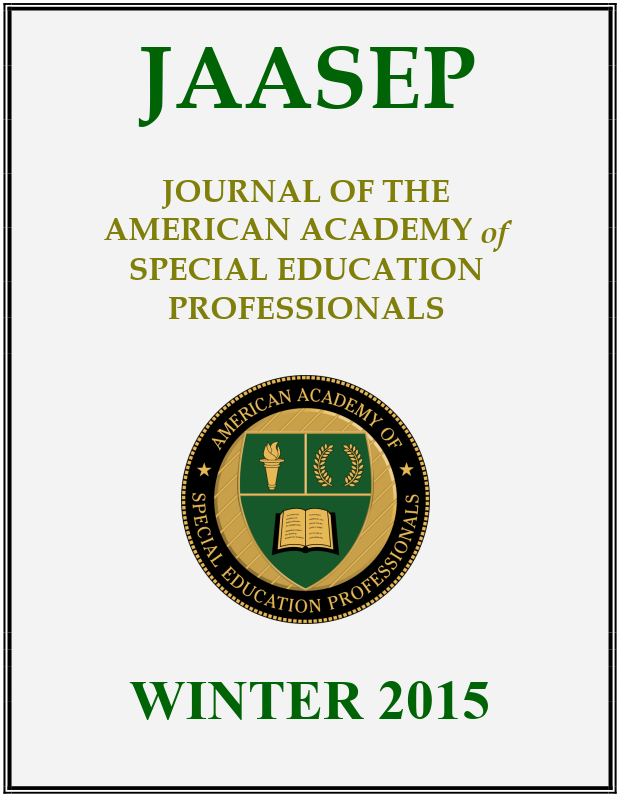The Perspectives of K-12 Stakeholders Involved in Early Implementation of Response to Intervention (RTI)
Bernard, H. R. (2001). Unstructured and semi-structured interviewing. In H. R. Bernard (Ed.), Research methods in anthropology: Qualitative and quantitative approaches (3rd ed., pp. 208–236). Walnut Creek, CA: AltaMira Press.
Brantlinger, E., Jiménez, R., Klingner, J., Pugach, M., & Richardson, V. (2005). Qualitative studies in special education. Exceptional Children, 71, 195-207. DOI: https://doi.org/10.1177/001440290507100205
Brownell, M. T, Sindelar, P. T., Kiely, M. T., & Danielson, L. C. (2010). Special education teacher quality and preparation: Exposing foundations, constructing a new model. Exceptional Children, 76, 357-377. DOI: https://doi.org/10.1177/001440291007600307
Byrd, E. S. (2011). Educating and involving parents in the response to intervention process. TeachingExceptional Children, 43(3), 32-39. DOI: https://doi.org/10.1177/004005991104300304
Coleman, M. R., Buysse, V., & Neitzel, J. (2006). Recognition and response: An early intervening system for young children at risk for learning disabilities. Full report. Chapel Hill: The University of North Carolina at Chapel Hill, FPG Child Development Institute.
Cook, B. G., Shepherd, K., Cook, S. C., & Cook, L. (2012). Facilitating the effective implementation of evidence-based practices through teacher-parent collaboration. TeachingExceptional Children, 44(3), 22-30. DOI: https://doi.org/10.1177/004005991204400303
Darling-Hammond, L. (2000). Teacher quality and student achievement: A review of state policy evidence. Education Policy Analysis archive, 8(1), 1-53. DOI: https://doi.org/10.14507/epaa.v8n1.2000
Edwards, P. A. (2004). Children's literacy development: Making it happen through school, family, and community involvement. Boston: Allyn.
Ferri, B. A. (2012). Undermining inclusion? A critical reading of response to intervention (RTI). International Journal of Inclusive Education, 16 (8), 863-880. DOI: https://doi.org/10.1080/13603116.2010.538862
Fuchs, D., & Fuchs, L.S. (2006). Introduction to response to intervention: What, why, and how valid is it. Reading Research Quarterly, 41, 92-99. DOI: https://doi.org/10.1598/RRQ.41.1.4
Fuchs, D., Fuchs, L. S., & Compton, D. L. (2012). Smart RTI: A next-generation approach to multilevel prevention. Exceptional Children, 78, 263–279. DOI: https://doi.org/10.1177/001440291207800301
Fuchs, D., Mock, D., Morgan, P.L., & Young, C.L. (2003). Responsiveness-to-intervention for the learning disabilities construct. Learning Disabilities Research & Practice, 18(3), 157-171. DOI: https://doi.org/10.1111/1540-5826.00072
Greenfield, R., Rinaldi, C., Proctor, P., & Cardarelli, A. (2010). Teachers’ perceptions of RTI reform in an urban elementary school: A consensual qualitative analysis. Journal of Disability Policy Studies, 21(2), 47-63. DOI: https://doi.org/10.1177/1044207310365499
IDEA (2004). Individuals with Disabilities Education Improvement Act. Public Law 108-446.
IDEA (2007). The response to intervention key terms and acronyms. Retrieved from http://www.ideapartnership.org/documents/RTI_Glossary7-30-07.pdf
Kavale, K. A. (2005). Identifying specific learning disability: Is responsiveness to intervention the answer? Journal of Learning Disabilities, 38(6), 553-562. DOI: https://doi.org/10.1177/00222194050380061201
76 Klingner, J. K., & Edwards, P. (2006). Cultural considerations with response to intervention models. Reading Research Quarterly, 41, 108-117. DOI: https://doi.org/10.1598/RRQ.41.1.6
Mellard, D. F., Byrd, S. E., Johnson, E., Tollefson, J.M., & Boesche, L. (2004). Foundations and research on identifying model responsiveness-to-intervention sites. Learning Disability Quarterly, 27(4), 243-256. DOI: https://doi.org/10.2307/1593676
National Center on Response to Intervention (NCRTI, 2013). RTI state database. Retrieved from http://state.rti4success.org/
NCLB (2002). No Child Left Behind Act. Public Law 107-115.
Reschly, D. J., & Ysseldyke, J. E. (2002). Paradigm shift: The past is not the future. In A. Thomas & J. Grimes (Eds.) Best practices in school psychology IV (4th Ed.) (pp. 3-20). Bethesda, MD: National Association of School Psychologists.
Seidman, I. E. (2006). Interviewing as qualitative research: A guide for researchers in education and the social sciences (3rd ed). New York: Teachers College Press.
Stage, S. A., Abbott, R. D., Jenkins, J. R., & Berninger, V. W. (2003). Predicting response to early reading intervention from verbal IQ, reading-related language abilities, attention ratings, and verbal IQ-word reading discrepancy: Failure to validate the discrepancy method. Journal of Learning Disabilities, 36, 24-33. DOI: https://doi.org/10.1177/00222194030360010401
Vaughn, S., & Fuchs, L. S. (2003). Redefining learning disabilities as inadequate response to instruction: The promise and potential problems. Learning Disabilities Research and Practice, 18(3), 137-146. DOI: https://doi.org/10.1111/1540-5826.00070
Walser, N. (2007). Response to intervention: A new approach to reading instruction aims to catch struggling readers early. Harvard Education Letter, 23(1). Retrieved from http://www.hepg.org/hel/article/23977
Downloads
Article Information
- Article Type Articles
- Submitted December 28, 2014
- Published February 15, 2015
- Issue Winter 2015
- Section Articles
